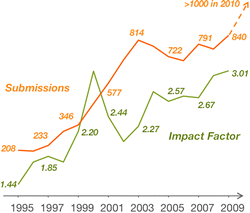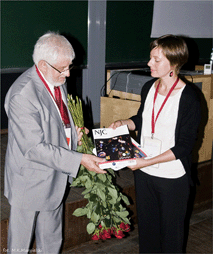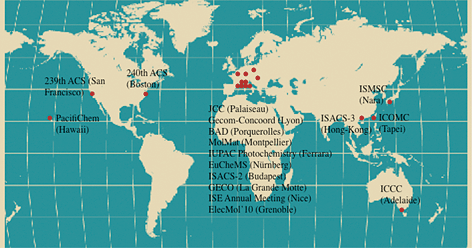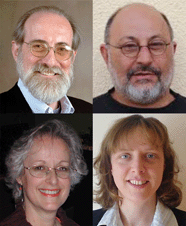NJC—Stronger than ever!
New editorial policy
Going into its 35th year, NJC is stronger than ever. The 2009 impact factor is above 3 and submissions passed the 1000 mark in 2010 (Fig. 1). | ||
| Fig. 1 The evolution of NJC's impact factor and submissions from 1995 to 2009. | ||
The journal's new editorial policy (published in the October 2010 issue and available at DOI: 10.1039/c005530c) reinforces the criteria applied to the selection of manuscripts for publication in NJC. We encourage potential authors to become familiar with our editorial criteria when selecting work to submit to NJC. We also ask NJC's reviewers to apply these criteria in a conscientious manner.
Work published in NJC highlights the central role of chemistry in the broader scientific endeavour through its contributions to other fields. This thematic is in perfect harmony with 2011's International Year of Chemistry.
NJC Focus: a new review format
In this first issue of 2011, we introduce our newest format, the Focus mini-review. The inaugural Focus, written by Professor Robert H. Crabtree of Yale University about multifunctional ligands, is featured on the cover. Each month, readers will find a new Focus, looking at a topic of high current interest, focusing on the key results and breakthroughs, and presenting the challenges currently facing researchers in the field.Themed issues
After the themed issues on Biophosphates (see Fig. 2), Main group chemistry and Coordination polymers in 2010, Molecular materials will be the theme of an up-coming issue this year. NJC will also publish an issue in honour of a distinguished chemist who perfectly epitomises NJC with the breadth of their research published over the years. | ||
| Fig. 2 NJC's Deputy Editor, Dr Marie Cote, presents the Biophosphates themed issue to Professor Wojciech J. Stec at the 18th International Conference on Phosphorus Chemistry. Photograph: M. K. Margielski. | ||
In contact with and supporting the chemistry community
To keep up with the latest advances in chemistry and to meet you, NJC editors attend numerous conferences each year—throughout the world and in a variety of disciplines (see Fig. 3). In 2011, NJC editors will be attending the 6th International Symposium on Macrocyclic and Supramolecular Chemistry (ISMSC), the 7th International Dendrimer Symposium, Hybrid Materials 2011, the 19th International Symposium on Photochemistry and Photophysics of Coordination Compounds, and many others. Keep an eye on the NJC web sites (http://www.rsc.org/nj and http://www.njc.cnrs.fr/) and check the calendar of our forthcoming conference appearances. | ||
| Fig. 3 Conferences attended by NJC Editors in 2010. | ||
Conferences also present opportunities to support the chemistry community. NJC Interface Poster Prizes are awarded to promising young chemists each year at a selection of conferences, and NJC also sponsors invited speakers and sessions. Details will appear on the NJC web sites as these occasions arise.
New editors
To improve our service to authors and to continue our actions in favour of the scientific community, we have added to our editorial staff in the Montpellier office. We are pleased to introduce our new Assistant Editors, Drs Yannick Guari and Laurent Vial. Active researchers with the CNRS (Yannick in materials chemistry and Laurent in organic/supramolecular chemistry), both have assumed their editorial duties as of October 2010 with enthusiasm and application. They join Dr Marie Cote, Deputy Editor, in Montpellier, and our Associate Editors, Professors Michael Scott and Peter Junk (Fig. 4). We welcome Laurent and Yannick to the NJC team, and you will have the opportunity to meet them at conferences in 2011. | ||
| Fig. 4 NJC editors Peter Junk, Michael Scott, Marie Cote, Yannick Guari and Laurent Vial. | ||
Best wishes for 2011!
On behalf of the editorial board members and editorial staff, we wish you all a prosperous and successful 2011. We hope that you will continue to support NJC, the journal for new directions in chemistry and related fields.Jerry Atwood and Mir Wais Hosseini
(co-Editors-in-Chief)
Denise Parent (CNRS) and Sarah Ruthven (RSC Publishing)
(Managing Editors)
News from RSC Publishing
Quality and growth continues
It's quality that really matters at RSC Publishing. And the 2009 Journal Citation Reports® proved that our quality is better than ever as our average impact factor (IF) rose from 4.9 to 5.4. It's an impressive figure, especially when compared with the average for chemistry journals of 2.4.But we don't rely on just one or two titles to boost our average. It’s our entire collection that counts: of the top 20 journals in the multidisciplinary chemistry category, 25% are from RSC Publishing and 90% of our titles have an IF over 3.
Our list of titles continues to grow: Food & Function and Catalysis Science & Technology are the latest titles to join our expanding portfolio. Plus, the number of articles we've published has increased by 74% in the last 2 years alone. We remain committed to providing a world-class publishing service to our authors, and delivering cutting-edge chemical science to readers throughout the world.
The IF and article growth figures provide a clear indication that more researchers than ever before are recognising journals from the RSC as a key resource to access the very best research.
2011 Books
With steady front-list growth and cutting-edge content, delivering excellence and authority, the RSC is one of the world's leading chemical science print and online book publishers.Totalling nearly 1000 eBooks, equating to one third of a million pages, the RSC eBook Collection delivers outstanding online research and opinion in a multitude of areas of the chemical sciences. Nine new RSC eBook Subject Collections offer additional flexibility.
With over 90 new print titles planned for 2011, including second editions of seminal texts, and new RSC Polymer Chemistry and RSC Metallobiology series launching, our contribution to chemistry collections worldwide is diverse, topical and high impact. Expect another first class collection of best selling chemical science titles in 2011. www.rsc.org/books
NEW RSC Publishing Platform
Access one million journal articles and book chapters in one simple integrated search.The new RSC Publishing Platform has been developed in consultation with the international scientific and librarian community. Together, we have identified the best and most valued interface and features that connect you with the highest quality scientific research. With one single search box, easily access our books, journals and databases for students, academics, researchers, scientists and professionals.www.rsc.org/platform
Free online access
Free online access is available to all our newest journals, and more—all you need to do is register for an RSC Publishing personal account. Then, when you are logged in, you will be able to access all of our free content. Currently, this includes:• All content of our newest journals for the first 2 volumes
• Any articles that are part of a special free access promotion (e.g. ‘hot’ papers, web themed issues, etc.)
• All journal content published more than two years ago
• A sample chapter from each book in the RSC eBook Collection
With your username and password, you can access the free content any time, any place—all you need is internet access. Register at www.rsc.org/personalregistration.
If your institution is a current customer with its IP registered, you will be able to access all of our free content. Other institutions can apply for free online access to our newest journals by using our online form: www.rsc.org/freeaccess.
ChemSpider
Have you heard about the RSC's award-winning chemical structure and text-based search engine—ChemSpider? It's FREE!ChemSpider provides access to:
• Millions of chemical structures
• An abundance of additional property information
• Tools to upload, curate and use the data
• A multitude of other online services like the RSC Publishing Platform
ChemSpider is one of the richest single sources of structure-based chemistry information.
Visit www.chemspider.com (for mobile devices: cs.m.chemspider.com)
International Year of Chemistry 2011
IUPAC (in conjunction with the UN and UNESCO) have proclaimed 2011 the International Year of Chemistry (IYC), the goals of which are to increase the public appreciation of chemistry in meeting world needs, to encourage interest in chemistry among young people and to generate enthusiasm for the creative future of chemistry.The RSC will be leading the way in the IYC 2011, supporting this important initiative through a series of events and activities.
| This journal is © The Royal Society of Chemistry and the Centre National de la Recherche Scientifique 2011 |

